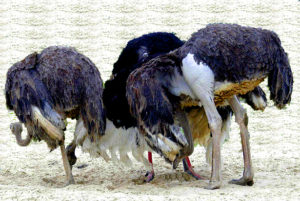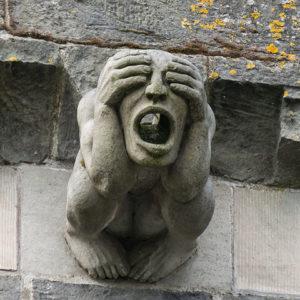There is none so blind as he who will not see. (Popular proverb)
 We say it about ourselves, about others, and sometimes, about entire groups: “How could I (he, she, we, or they) have been so blind?”
We say it about ourselves, about others, and sometimes, about entire groups: “How could I (he, she, we, or they) have been so blind?”
This later fallibility is the focus of “Willful Blindness: Why We Ignore the Obvious at Our Peril.” In it, author Margaret Heffernan combines research and compelling case studies to examine our collective societal ‘ostrichness’.
According to Heffernan, our homogeneous tendencies—AKA our lack of diverse perspectives—induces our collective sightlessness. Like the cultural phenomena of how our inner circle affects our weight and habits, our connections and confidants can also influence what we see, or in the case of many large-scale tragedies, what we ignore.
The news of wide-spread sexual abuse among Catholic priests and systematic cover-up by the Church is a stunning example. Individual stories had surfaced and been even been reported by the Boston Globe, but it took the arrival of a new editor from Florida, Marty Baron, to see the bigger picture. As a Jewish outsider, Baron was not prone to the same unconscious bias as the largely Catholic community, including reporters. He empowered the Globe’s Spotlight investigative team to pursue, uncover, and report the magnitude of the abuse. (“Spotlight,” the 2016 Academy Awards Best Picture, magnificently recounts this story.)
Bernie Madoff preyed on the über cliquishness of his investors and it enabled him to bilk billions of dollars. It’s almost unfathomable to read how many times Harry Markopolos, number-cruncher-turned-author, sounded the Madoff fraud alarm before anyone eventually listened. “No One Would Listen” provides his riveting first-person account.
“Willful Blindness” probes the root cause of these and other hidden-in-plain-sight calamities that were shrouded by bias. Our innate partiality and prejudices create blinders that allow us to normalize, rationalize and deny warning signs.
It’s tempting to believe that it’s that other guy/gal who is gullible. They have blind spots while we would never miss the obvious. Truth is that too much familiarity can lull any of us down a comfy rabbit hole. It can blur our critical thinking; we don’t ask tough questions because we don’t want tough answers. Heffernan notes,
“When we are willfully blind, it is in the presence of information that we could know, and should know, but don’t know because it makes us feel better not to know.”
Like a modern-day Cassandra, Heffernan warns of our vulnerability and offers insights:
“Alerted to how willful blindness works, we may be more attuned to it and determine to be on our guard. But old habits die hard; the riverbed is deep and we can’t shake off millennia of neurobiology and a lifetime of cultural comforts.
What we can do is ask the questions, what are the conditions required for willful blindness to flourish? How far might we be able to mitigate those conditions, to make it easier to hear the quiet voices at the back of our minds begging for attention? Could we develop new habits that might keep us more aware?”
 There has been much written recently of how we, as a society, are becoming more culturally isolated and politically polarized—a Petri-dish for blindness.
There has been much written recently of how we, as a society, are becoming more culturally isolated and politically polarized—a Petri-dish for blindness.
Heeding the words within “Willful Blindness” won’t make us immune, but it may make us less susceptible.
“To see what is in front of one’s nose needs a constant struggle.”
– George Orwell